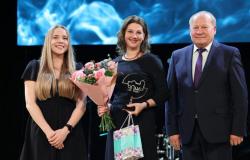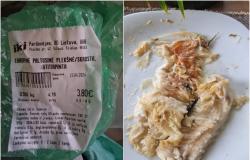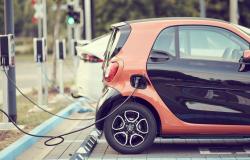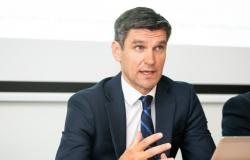The former warehouses of the building have been turned into a beautiful space, equipped with a canteen and a restaurant area for students to practice, an educational bar and relaxation areas. The teacher’s room and the reading room, which have glass walls, have also been renovated, as have all common rooms on the first floor. This solution provides much more space. Well, part of the old lobby has become a small cinema, where students can spend their breaks.
Ten modern learning laboratories are equipped, where future chefs, pastry chefs and waiters-bartenders acquire practical skills. The laboratories are equipped with equipment that is comparable to many cafes and restaurants.
But it is especially important that this training center lives sustainably: the learning process takes place not only in modern and beautiful, but also in premises that meet green standards. The VESK building became the first public building in Lithuania, where everything is equipped according to ISO and green standards.
All materials used are sustainable, windows are made of recycled plastic. Even in the office of VESK director Saulius Zybarts, the carpeting is made from scraps, the tables are remade from older ones, but it is comfortable to work here.
Everything was largely updated after the renovation of the building three years ago.
It produces electricity on the facade
S. Zybartas said that such a school requires huge energy costs, so an energy audit was conducted and it was explained how savings can be made. The first project undertaken was the installation of a 100 kW solar power plant on the roof of the school after receiving funding.
“Costs have obviously decreased – during the first year, when the power plant was installed in the summer, when a kilowatt hour of electricity cost 14 cents, we managed to save about 9,500 EUR,” the director was happy.
Soon, the electricity-generating panels were placed on the southern facade of the school, which in the past was constantly overheated in the sun. VESK became the first public building on the facade of which energy is produced. In winter, when the batteries on the roofs do not produce energy because they are covered in snow, the process starts as soon as the sun shines on the wall of the building.
Sustainability is also in the teaching process
VESK is not only managing itself sustainably – it is already teaching others based on its experience. “Last year we organized the conference of the European Association of Hotel and Tourism Schools (AEHT), about 800 people came from different countries, and I had something to tell them. Now, in the education process, the focus is everywhere on green, sustainable things, and we simply do that”, stated S. Zybartas.
One of the latest decisions of the administration was to sell 15-20 m. old cars and buy electric ones – so far the institution has one electric car and it seems to be really paying off.
The principles of sustainability are also implemented in the education process itself. In addition to such standard things as waste sorting, VESK has an anti-waste program.
Short chains have been formed: for example, the school has a branch in Veisiejai (Lazdijai district), where future agricultural specialists are trained. The vegetables grown by them are brought to Vilnius, and the young chefs learn to cook from them. What is produced is, of course, eaten, and the leftovers go to compost bins in the basement, where they are turned into compost in just a day. This one goes to the greenhouses after the next delivery of food.
Product transportation is planned by future forwarders, who are also learning VESK, thus gaining practice.
“One of the steps was to modernize the building, the other was to improve the quality of education, and in terms of value, everything comes together beautifully.” If you want to teach children something, you have to behave yourself – you can’t say one thing and do another. When students see that we take great care to ensure that resources are not wasted, it gets them involved,” said S. Zybartas.
Looking for creative educational solutions
Of course, the education of students is taken care of in other aspects as well. Here, in hospitality programs (cooks, waiters, confectioners, hotel economists, guest service workers are trained here), the training process takes place in three stages. In the first stage, theory is learned and practiced in laboratories. In the second stage, you learn to work with clients, and in the third, you travel to do internships in companies.
It’s no secret that when a young man learning to be a waiter-bartender goes to a restaurant for the first time to serve customers, he may get nervous, his hands may shake, and even spill his drink. On the other hand, when a young person practices with his classmates, everything is fine, but he gets scared when he encounters strangers.
So it was decided that it would be best if the first customers would be members of the community – students and teachers of other specialties. Young waiters who have practiced with them no longer feel discomfort and calmly travel to potential workplaces for practice.
By the way, there is currently a shortage of about 300 waiters-bartenders on the labor market in Vilnius, so getting an internship and getting a job is really not difficult.
In addition, the school can choose who it wants to work with to ensure that students are protected from abuse and gain the skills they need. Successful cooperation with Hilton, Radisson, Ibis, Marriott and other hotels. A large part of Hilton’s kitchen staff are former VESK students. Not a single student has his own restaurant or food studio.
Got a new challenge
There is no shortage of activities and opportunities for representatives of other professions at the training center. During the pandemic, the profession of accountant has become very popular, the training of massage therapists is in high demand and well developed (the school has the right to issue special diplomas of the World Massage Federation), tailors are being trained (a number of people who have lost their ability to work and have disabilities are also trained in this program), travel agents, freight forwarders, representatives of the beauty sector , preschool education teacher assistants.
In general, the current VESK is nine schools merged into one. The training center has branches in Druskininkai, Veisiejai, Pakruojai, Zarasaii. There, the focus is on specialties that are more necessary for a specific region.
Well, in Vilnius, a little more than a year ago, Šilo Street was connected to VESK. operated a special school for children with disabilities (mainly mental). We have to think about how to integrate those students into the labor market according to the possibilities. Here, it is important to take into account the uniqueness and individual abilities of each child and to ensure that such children do not grow up in isolation, but acquire social skills.
“I think we have made a strong strategic step – we have become members of the Diversity Charter, and many responsible businesses have joined this charter, which will hopefully open a window of opportunity for those children and they will be able to realize themselves.”
We try to choose a specialty for everyone based on their abilities. This is quite a challenge, but at the same time very interesting”, said the enthusiastic director of VESK, whose team is not short of ideas.
Tags: school revealed conserves energy managed save impressive amount
-





